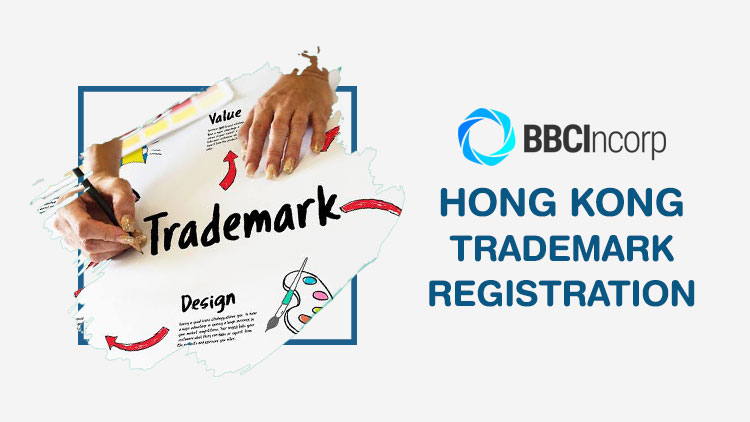After setting up a company in Hong Kong, trademark registration is highly recommended if you wish to add protection to the name of your newly formed business.
This article would let you comprehend a step-by-step guide to trademark registration in Hong Kong!
Overview of trademark registration in Hong Kong
Definition of a trademark
Trademark is typically any sign, letters, words, phrases, designs, indications, characters, numerals, smells, colors, sounds, or any combination of these. Trademark is considered a valuable business asset as it helps corporations:
- To identify your company’s goods and services
- To distinguish your company goods and services from those of other competitors
By and large, you can see a trademark on a product, a package, a voucher, a label, or on company buildings.
Trademark registration in Hong Kong typically costs HK$2,000 plus HK$1,000 for each additional class of goods or services.
Duration of a trademark
In accordance with the Hong Kong Trade Marks Ordinance Cap.559 (section 49), the duration for a registered trademark in Hong Kong is a 10-year period.
It is worth noting that you are subject to pay a trademark renewal fee every 10 years if you wish to maintain your trademark in Hong Kong. Your registered trademark goes into effect from the original date you filed your application.

Registered vs unregistered trademark
In fact, a registered trademark in Hong Kong is a property right. It is the result of successfully registering the trademark under Hong Kong Trade Marks Ordinance. The Hong Kong trademark registration fee is listed on the Intellectual Property Department’s website.
It appears to be popular that the ® symbol is to indicate that your trademark is registered, while the unregistered trademark is often appended to the ™ symbol.
Note that the ® symbol cannot be used for an unregistered trademark, otherwise it is deemed a criminal offense.
Criteria for an appropriate trademark
There are certain criteria in choosing a trademark that every business in Hong Kong should be well perceived:
- A trademark is not the same thing as a business name;
- A trademark must not be confusingly identical or similar to another person’s registered trademark, business name, company name, or domain name;
- A trademark is more likely to be rejected for registration if it is a person’s family name, a descriptive sign of products and services, or includes a general term without distinctive character.
Reasons why trademark registration is necessary

Trademark registration is definitely important, as it is well attached to your rights of being protected. A registered trademark is of vital significance in proving that you are the owner of the mark, and you are entitled to exclusive rights of using the trademark for goods/services.
Starting an e-commerce business is a typical example of how trademark registration is vital. They have to access worldwide and scale up very fast, it is quite common to see that hundreds of e-commerce sellers/firms need to face the headache of brand value and recognition infringement to protect their products and services locally and globally.
In addition, if there is any infringement of your registered trademark in the absence of your consent – i.e., use your trademark or use a name which is similar or the same as your trademark in the similar or same goods or services, then you can pursue legal action against this trademark infringement.
Free ebook
Everything you need to start doing business in Hong Kong
- Company registration process
- Compliance & tax requirements
- Employment & hiring issues

How to register a trademark in Hong Kong
Before you apply
It should be noted that the application for trademark registration in this country can be made online or filed physically with the Registrar of Trade Marks.
Typically, an application to register a trademark in Hong Kong will include:
- An application form for the trademark registration;
- Personal details of the applicant, such as the name and address;
- Specifications of the goods or services in respect of which it is sought to register the trademark;
- A clear presentation of the trademark proposed;
- Additional documents can be requested by the rules.
The applicants are advised to conduct a careful trademark search to check whether the trademark is already registered at the Registrar or in prior application by others. Make sure the trademark that has been chosen to apply meets specific requirements as complied with the Trade Marks Ordinance. Also, the applicants must notice to file the application in one of the official languages.

From application to registration process
Hong Kong trademark registration is not so complicated. You can take a look at the following steps as we summarized below:
- After you have filed the application with the Registrar, they will then examine its compliance with the Ordinance.
- Once your application formalities meet all requirements and there are no objections to the trademark, it will be published in the Hong Kong Intellectual Property Journal. Note that it normally will take you a minimum of 6 months from the date your application is received, to the step of registration.
- The next step is to see whether anyone wants to oppose your trademark or not.
- If there is no opposition, or the opposite result is concluded in favor of your trademark, then the Registrar of Trade Marks will issue a certificate of registration for your trademark.
* In case of objection to the trademark:
In case the mark objection occurs (as the proposed trademark is to be confused with another trademark for example), the applicants then are granted a course of 6 months to satisfy all the requirements for registration. It is also possible to ask for an extension of 3 months under specific circumstances.
In addition to an endeavor to tackle the objection by fulfilling all criteria, the applicants can also take into account options like seek an alternative trademark, or call for a hearing.
* In case of opposition to the trademark
Before reaching a trademark registration, opposition to the trademark by a third party can take place. It means that someone has reviewed your trademark in the Intellectual Property Journal and found something confusingly with his/her trademark. Consequently, they decide to deliver an opposition notice to the Registrar.
In this case, there are two options for you – the applicant:
- Withdraw your application (in this case, you are required to pay the other party’s costs); OR
- File a counterstatement as your response
Both sides will then need to prepare evidence to prevail in the hearing office.
Conclusion
It is crystal clear that trademark registration is essential for those running trading businesses, e-commerce companies, and any business with the need of making profits. Despite the fact that trademark registration in Hong Kong is not mandatory, it is highly recommended for a company to have its registered trademark.
The whole process from its application to registration is not too complicated; however, it fairly takes time. It is advised that the Hong Kong trademark registration application should be arranged as a sine qua non of your business plan.
Should you have any questions regarding trademark registration in Hong Kong as well as other services of setting up a company in Hong Kong, do not hesitate to drop us a chat message or sending email via service@bbcincorp.com!



